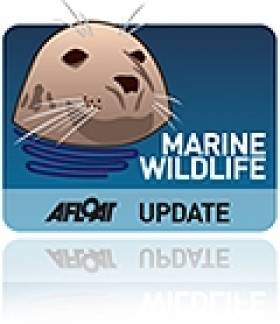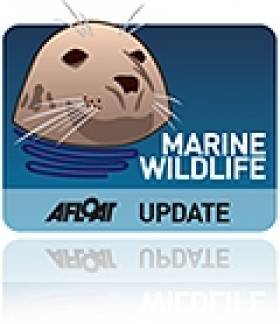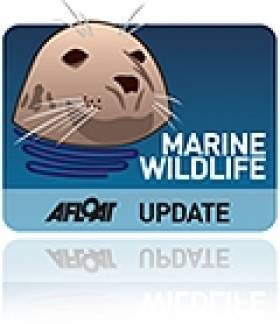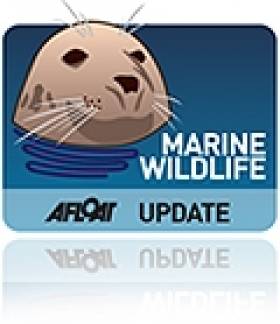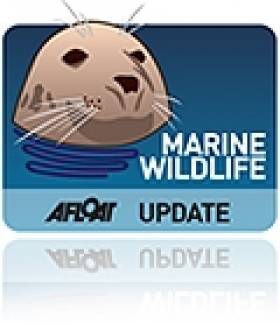Displaying items by tag: IWDG
Aerial Survey of Whales Begins
The first ever Air Corps marine animal survey of whale and dolphin activity in Irish waters is set to begin today, the Irish Times reports.
A survey team accompanied by members of the Irish Whale and Dolphin Group (IWDG) were scheduled to take off from Casement Aerodrome this morning headed for the southeast coast, where humpback whales have recently been sighted near Curracloe and Hook Head.
According to the IWDG, 19 whale and dolphin species have been recorded in Irish waters since 1948, the most common sightings being harbour porpoises.
The Irish Times has more on the story HERE.
New Humpback Whale in Irish Waters
The Irish Whale and Dolphin Group (IWDG) has reported the sighting of a humpback whale new to Irish waters.
Andrew Malcolm of the IWDG along with Martin Colfer spotted the whale just west of Dunmore East - a year after the first sightings of 'Hooky' who gave whale-watchers a treat in the early part of 2010.
Malcolm confirmed that this humpback was indeed a new addition to the Irish catalogue. He described it as behaving "in a very co-operative manner" and noted that it "regularly 'fluked' in front of the boat".
Click HERE for more on the story, including some spectaular images.
Vets Get to Grips With Whale, Dolphin Post-Mortems
The Irish Whale and Dolphin Group's (IWDG) recent workshop on the post-mortem examination of stranded dolphins and whales is hoped to encourage the building of much needed experience for Ireland's vets dealing with marine animals.
More than 20 veterinarians from across the country attended the workshop in Athlone, where they were shown how to carry out a post-mortem from a research perspective and taken through the post-mortem protocol, as well as the collection of samples for various parameters from bacteriology to genetics.
"The IWDG have long advocated that the post-mortem examination of stranded cetaceans should be carried out by veterinary pathologists to determine their cause of death and provide samples for life-history studies," said the group's Dr Simon Berrow.
Fin Whales Captured on Video
The Irish Whale and Dolphin Group (IWDG) has posted photos and video of last weekend's fin whale research expedition off the coast of Co Waterford. SEE VIDEO BELOW
The group encountered a number of fin whales feeding between Hook Head and Helvick Head, and got close enough to two whales swimming near the shore to take clear photos and a biopsy sample.
Another biopsy was taken from a group of three whales feeding just below the surface close to Dungarvan.
"These whales were swimming in water just 15m deep. For an animal whose body length is 20m, this was a surprising discovery," said the IWDG's Conor Ryan.
The Irish Independent reports that the majority of fin whale sightings normally come from Cork and along the western seaboard, but most recent spottings have been from further east in Waterford and on the Wexford coast.
Removal of Whales to Cost Council €10,000
The pod, which had been observed in waters between Arranmore Island and Burtonport during the week before they stranded themselves on a beach on Rutland, were also believed to be the same pod monitored off the South Uist, off the Hebrides. Shortly before that it was feared that the whales may have also attempted to beach themselves.
Dr Simon Berrow of the Irish Whale and Dolphin Group (IWDG) said he could not rule out sonar interference for confusing the whales and leading to their beach deaths. For information on the IWDG logon to www.iwdg.ie
Newborn Bottlenose Dolphin Beaches in Co Clare
The Irish Whale and Dolphin Group (IWDG) reports that a newborn bottlenose dolphin calf was washed up in Doolin, Co Clare last week (photos here).
Measuring 1.2m in length and weighing 21kg, the IWDG said it was "by far the smallest bottlenose dolphin recorded stranded in Ireland".
"From the bent dorsal fin and curled tail flukes we can confidently say this dolphin was only just born and live-stranded," said IWDG co-ordinator Simon Berrow, who added that the group could only speculate as to what happened.
"Maybe it was separated from its mother on birth, maybe she was unable to help it to the surface to take its first breath, maybe the mother was alone and did not have the support of a maternal group to assist at birth."
Massive Increase in Whale and Dolphin Strandings
New figures to be released this week on marine animals point to a whopping 25% increase in whale and dolphin strandings in the UK and Ireland.
BBC News reports that data collected by the UK Cetacean Strandings Investigation Programme (CSIP) show reported strandings have risen by a quarter since records began 20 years ago.
The news comes just weeks after the shocking mass stranding of pilot whales in Co Donegal.
It's also reported that at least 500 dolphins, porpoises and whales have been found stranded on British beaches this year.
Commenting on the rising numbers, Ian Enlander of the Irish Whale and Dolphin Group (IWDG) told BBC News: "It may be a sign that awareness of strandings is increasing, or perhaps something else is going on."
The BBC News website has more on the story HERE.
New Pontoon Key to Saving Stranded Whales, Dolphins
A new pontoon intended to refloat marine animals such as beached whales and dolphins along the Atlantic seaboard was demonstrated at the weekend ahead of the Galway Science & Technology Festival.
The Irish Times reports that divers, scientists and local volunteers were among those participating in the training exercise on Gurteen beach, near Roundstone, which involved rescuing and refloating a dummy pilot whale.
Dr Simon Berrow of the Irish Whale and Dolphin Group (IWDG) which ran the exercise said he hoped other coastal communities would follow the example with their own training sessions, given the growing number of strandings along Ireland's west coast.
The new pontoon - which was put on display in the festival exhibition at NUI Galway on Sunday - was purchased with funds raised by the local community and a BBC television team producing the latest series by popular adventurer Monty Halls.
New Course For Marine Tour Operators
The Irish Whale and Dolphin Group (IWDG) is running a new course for marine wildlife tour operators in Galway on 27-28 November.
The two-day course - at the campus of the Galway-Mayo Institue of Technology in Letterfrack - is intended to promote and support responsible marine wildlife tourism, and may provide a basis for a future accreditation scheme for the industry.
The course will be delivered by Dr Simon Berrow and Conor Ryan of the IWDG and is part funded by the Irish Environmental Network under the Department of Environment, Heritage and Local Government's Biodiversity Fund 2010.
Topics covered in the course will include the identification and ecology of marine animals and sea birds, as well as the relevant legislation pertaining to the wildlife tourism industry.
The course fee is €50 per person. Further information is available from Simon Berrow at the Irish Whale and Dolphin Group, Merchants Quay, Kilrush, Co Clare at 086 8545450 or [email protected].
Sonar Possible Culprit in Whale Death Tragedy
Sonar activity by Royal Navy submarines may have caused the deaths of up to 35 pilot whales off the coast of Co Donegal at the weekend, an expert has claimed.
Dr Simon Berrow of the Irish Whale and Dolphin Group (IWDG) said that naval activity in the area is one possible cause of the tragedy.
"Naval exercises use a low frequency active sonar which is known to affect whales very badly," he told the Belfast Telegraph. "Basically it affects their sonar and causes a gas embolism, like the ‘bends’."
The Telegraph reports that tests are still being carried out to determine if the whales that beached on Rutland Island, near the fishing village of Burtonport, are the same as a group monitored in Scotland's outer Hebrides the previous weekend.
The pilot whales had reportedly been swimming off Co Donegal for the past week before they were found dead.
The Belfast Telegraph has more on the story (with photos) HERE.



























